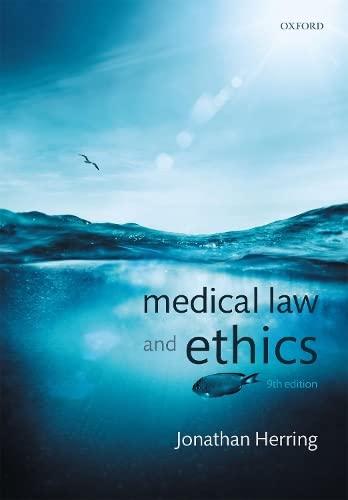Question
I need assistance in in explaining the following section of the court case between Yu and the Health minister. http://classic.austlii.edu.au/au/cases/cth/FCA/2013/367.html [10] Also relevant to the
I need assistance in in explaining the following section of the court case between Yu and the Health minister. http://classic.austlii.edu.au/au/cases/cth/FCA/2013/367.html
"[10] Also relevant to the present question is the circumstance that approvals under s 90 or s 90A are not given as benefits or emoluments to particular pharmacists. Rather, the scheme of the NH Act, relevantly, is to ensure that the community is provided with convenient access to pharmacies, conducted by appropriately qualified professionals, for the purpose of obtaining drugs and medicinal preparations which are beneficial in the treatment of sickness or disease but which may, at the same time, be harmful if not properly prescribed and dispensed. That does not come through in terms in s 90, but it may be seen in s 90A(2)(a) itself, which is sufficient for present purposes. An approval is, in this respect, different from the granting of a qualification or a visa, for example, which are specific benefits to which the individual becomes entitled. I have held that the applicant was entitled to be heard on the fourth respondents' request under s 90B, but it is difficult to see how his own individual circumstances might have been relevant to the substance of the Minister's decision under s 90A. The fact that the s 90A approval was not concerned with the applicant's own position, or with his rights as a pharmacist, is another reason to consider it likely that the legislature did not intend that the Minister's failure to accord natural justice to someone in the position of the applicant would produce the result that the approval ostensibly resulting therefrom would be a legal nullity.
[11] The automatic rejection provisions of subs (4) and (5) of s 90B also speak against the conclusion that a decision ostensibly made under s 90A, but in breach of the rules of natural justice, should be treated as a nullity. Were it otherwise, such a breach would produce the result, under subs (4), that the Minister was taken to have decided not to consider the request or, under subs (5), that the Minister was taken to have decided not to exercise the power of substitution arising under s 90A. That is to say, the s 90A process would then be a closed event, and the court could not, consistently with the statutory scheme, require what had been done in fact but irregularly to be done again. A procedural oversight would have produced a substantive permanent outcome. It would be no answer to say that the pharmacist could make another request under s 90B, since the 30-day time limit for which subs (3) provides may, and usually would, by then have expired. I cannot think that the legislature would have intended a breach of the rules of natural justice to leave the pharmacist in this kind of procedural cul-de-sac.
[12] By reason of the considerations discussed above, which are essentially ones of statutory intent, I take the view that the Minister's failure to accord natural justice to the applicant did not produce the result that the approval she gave to the fourth respondents on 20 July 2012 was a nullity. That approval, albeit infected with legal error, was nonetheless an approval in fact for the purposes of s 90E of the NH Act."
Step by Step Solution
There are 3 Steps involved in it
Step: 1

Get Instant Access to Expert-Tailored Solutions
See step-by-step solutions with expert insights and AI powered tools for academic success
Step: 2

Step: 3

Ace Your Homework with AI
Get the answers you need in no time with our AI-driven, step-by-step assistance
Get Started


